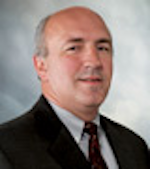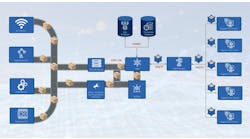Aurelien Le sant is chief technology officer, industrial automation; senior vice president, innovation & technology, at Schneider Electric.
What new technologies are driving product development and why?
Aurelien Le sant, chief technology officer, industrial automation; senior vice president, innovation & technology, Schneider Electric: We are living in exciting times for the industrial automation market. Innovations across the board are helping us build new value into automation architectures and solutions.
- Artificial intelligence (AI) and machine learning (ML) are transforming how we achieve operational efficiency, safety and quality. Contextualized real-time decision-making at the machine or production asset, AI-driven asset performance management and vision systems, and remote and autonomous operations are just a few use cases.
- Communication evolutions with OPC UA, TSN and 5G are helping drive the transformation of operations data into valuable insights while also simplifying networks and flattening architectures at the shop-floor level, for example, a single cable to funnel all communications. They also provide new interoperability and flexibility and facilitate the integration of mobile elements, such as robots, augmented operators and drones.
- The Internet of Things (IoT), the cloud, APIs and IT-based data models help us provide customers with actionable analytics by enabling fluid dataflows from the shop floor to the corporate office, so that decisions are made with high-quality, near-real-time information.
- Universal automation is the world of plug-and-produce automation software components based on the IEC 61499 standard that solve specific problems in a proven way, like an app store for industry. Schneider Electric strongly supports interoperability and has launched its own universal automation solution, EcoStruxure Automation Expert. We invite industrial developers everywhere to create their own software components and solutions based on the IEC 61499 standard, which can easily interoperate with EcoStruxure Automation Expert.
How will machine automation and controls alter the way companies staff their operations in the future?
Aurelien Le sant, chief technology officer, industrial automation; senior vice president, innovation & technology, Schneider Electric: The next wave of the automation workforce won’t be controls engineers. They will be data engineers focused on fine-tuning the process to generate positive business outcomes and performance. Decision-making on the field will be supported by global insights and guidance to minimize risk and increase performance. Our customers are already leveraging our remote-management and augmented-reality solutions to better match their work habits and centralize expertise in an efficient way.
How is the development of software solutions impacting requirements for hardware?
Aurelien Le sant, chief technology officer, industrial automation; senior vice president, innovation & technology, Schneider Electric: Hardware continues to evolve, but tomorrow’s challenges will require the intelligent application of software-based technologies across the full operational lifecycle. This digital paradigm will provide unprecedented operational capabilities and support new business opportunities for all industrial stakeholders. It is an ongoing transition, and each expertise is needed to collaborate on cybersecurity, data backbone and IT integration.
As engineering and IT continue their convergence, which one is and/or will be leading the direction of future automation and technology?
Aurelien Le sant, chief technology officer, industrial automation; senior vice president, innovation & technology, Schneider Electric: In the industrial space, the ability to manage data throughout the complete lifecycle in a consistent and safe manner is the foundational requirement to address current and future needs of businesses.
Data will be the leading element driving different levels of integrations, from end points to the cloud, and between different facets of industrial processes. The integration of power and automation is one example. IT technologies enable those integrations and will bring about the step-change improvements possible in the industries of the future.
As the world’s most sustainable corporation and a global manufacturer with an end-to-end network of smart factories and smart distribution centers, including three designated by The World Economic Forum as Advanced Lighthouses, Schneider Electric is on a mission to make industries of the future eco-efficient, agile and resilient through open, software-centric industrial automation.






